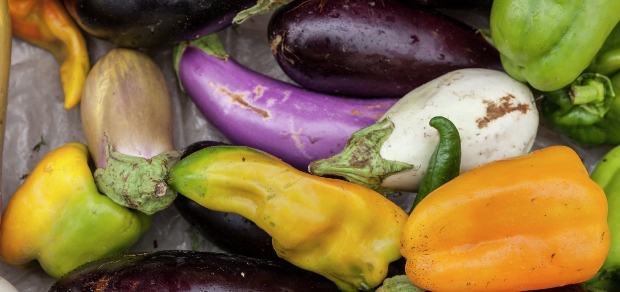
What’s the Deal with Nightshades and Psoriasis?
When we think of vegetables or fruits, we rarely think of them as something that might do harm to our bodies. In general, they’re a delicious nutrient-delivery service sprung from the ground. But in the case of those that fall into the nightshade category, the conversation takes a turn. There’s concern among some people with psoriasis that these vegetables—which contain a chemical called solanine—could cause symptoms to flare. Here, Elizabeth DeRobertis, a New-York based registered dietitian, answers our most pressing nightshade-related questions.
What exactly is a nightshade?
Nightshades are part of the plant family Solanaceae. This family of vegetables and fruits contains a chemical called solanine. Some people think that solanine may increase inflammation; it’s toxic in very high concentrations. Some of the most common nightshade vegetables people eat are white potatoes, tomatoes, eggplants, bell peppers, cayenne peppers, and paprika.
Why do we keep hearing about some people with psoriasis avoiding nightshades?
There is a theory that nightshade vegetables may increase inflammation, in turn making inflammatory conditions, such as psoriasis and psoriatic arthritis, worse. In a national survey study from UCSF in 2017, people reported skin improvement after reducing alcohol, gluten, and nightshades. However, the Arthritis Foundation does not support this notion. Its position is that nightshade vegetables are very nutrient dense, and that there are health benefits in these vegetables that may actually decrease inflammation.
For most people, there’s no need to avoid nightshades completely. However, just like with any food, it is possible to have an intolerance to them.
If a person finds that certain foods, including nightshades, trigger their psoriatic symptoms, they should avoid them. The best way to know how nightshades impact your symptoms is to do an elimination diet, which is a temporary trial of eliminating a type of food to determine if there is a measurable benefit. You can always opt for alternative options that are non-nightshade vegetables, such as sweet potatoes, yams, cauliflower, and mushrooms.
What results could someone with psoriasis or psoriatic arthritis experience by avoiding nightshades?
If someone is sensitive to nightshades, once they eliminate them for about four weeks, they may experience an improvement in skin condition and a decrease in joint pain if they suffer from arthritis. In my practice, I have had a number of patients experiment with this over the years. Only a very small percentage of patients experienced a benefit from cutting out nightshades. We really need more information to understand whether nightshades affect psoriatic symptoms. To date, there’s little scientific research to associate nightshade-vegetable intake and inflammation.
How can someone figure out whether cutting out nightshades has helped?
If you decide to try this, you should eliminate all nightshades and products containing these vegetables for at least four weeks. Use a food log to keep track of the severity of your symptoms during this time. After this elimination period, you should start reintroducing nightshade vegetables one at a time to see which one is the individual trigger. Ideally, you would not need to eliminate all of them indefinitely.
That said, there’s no credible information that shows one nightshade is more or less inflammatory than the other. In fact, there is very little research that shows that any of the nightshades actually cause inflammation.
Is there anyone who should not avoid nightshades?
Nightshade vegetables are very nutrient dense. If someone isn’t trying to get to the source of a chronic condition and they’re not allergic or intolerant to the food, there would be no reason to eliminate such a healthy and nutrient-dense food group.
For example, in one study, researchers found that inflammation and DNA damage was actually reduced in healthy men who regularly ate yellow or purple potatoes for six weeks. These are nightshade vegetables, and they were beneficial in this case.
So, people should not avoid this food group on just a whim to avoid missing out on helpful nutrients.
Board-certified dermatologist Allison Truong, M.D., reminds us that people with psoriasis have a higher risk of metabolic syndrome—obesity, diabetes, dyslipidemia, nonalcoholic fatty liver disease, and cardiovascular disease. So, it’s more important to focus on overall health with lifestyle choices such as staying at a healthy weight, exercising regularly, and eating a nutritious diet to lessen the symptoms and risks associated with psoriatic disease.
You May Also Like:
Want to Read More?
Access all of Twill Care’s content, community, and experts for free!
Already a member? Login
Want to Read More?
Access all of Twill Care’s content, community, and experts for free!
sign UP For FreeAlready a member? Login

